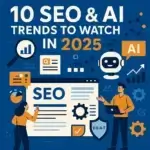- Your cart is empty Browse Shop
10 SEO & AI Trends 2025 for WordPress — Stay Visible in the AI Era

Semantic clarification — GEO: In this content, GEO means Generative Engine Optimization — optimization for AI-powered search/answer engines, not geolocation. GEO is the evolution of SEO in AI-driven search.
🚀 SEO & AI Trends 2025: How to Future-Proof Your WordPress Site
Introduction
Search Engine Optimization (SEO) is changing faster than ever. With the rise of AI-powered search engines — such as Google SGE (Search Generative Experience), Bing Copilot, and Perplexity AI — the rules of visibility are evolving.
As a result, click-through rates from Google are falling because users now receive direct AI-generated answers.
For WordPress site owners and SEO specialists, this shift is crucial. How can you stay visible when Generative AI replaces traditional search results?
This guide highlights the 10 key SEO and AI trends for 2025 and explains how to adapt your WordPress site to stay competitive.
1️⃣ The Rise of Generative Engine Optimization (GEO)
Generative Engine Optimization (GEO) represents the next evolution of SEO.
While traditional SEO focuses on ranking in Google, GEO helps make your content AI-ready so that models like ChatGPT, Claude, and Gemini can understand and cite it.
Why it matters:
- AI engines don’t just read your meta tags — they analyze semantic clarity.
- Well-structured, machine-readable content performs better.
How to apply it in WordPress:
- Use tools like GEOmatic AI to auto-generate AI sitemaps and clean JSON-LD schema.
- Structure your content with clear headings and short, easy-to-read paragraphs.
For a technical breakdown, check Google’s AI features documentation — it shows how AI-powered search interprets your site’s structure.
2️⃣ Optimizing for AI Overviews & Rich SERP Answers
Google’s AI Overviews and Bing’s summaries now dominate search results. Instead of classic blue links, users see AI-generated paragraphs.
Therefore, your content must be clear, structured, and easy to extract.
Action steps:
- Use FAQ and HowTo schema.
- Add short, quotable answers.
- Keep your AI sitemap updated to guide bots.
Moreover, concise statements and verified data help AI include your site in its generated summaries.
3️⃣ The Explosion of Conversational Long-Tail Queries
Search behavior is becoming more conversational. People now speak to AI assistants as if they were human.
Opportunities:
- Focus on question-style long-tail keywords.
- Use tools like ChatGPT, AnswerThePublic, and Keyword Insights.
- Write around search intent — explain what, why, and how.
Consequently, your content will align better with voice search and conversational AI models.
4️⃣ Reinforced E-E-A-T: Experience, Expertise, Authority & Trust
Both Google and AI models measure content credibility through E-E-A-T.
Practical WordPress tips:
- Add detailed author bios with credentials.
- Display clear contact and business information.
- Use plugins such as GEOmatic AI to include Organization and Website schema automatically.
In addition, transparency boosts user confidence and helps AI evaluate reliability.
5️⃣ AI-Readable Multimedia: Text, Image, Audio & Video
AI models can now analyze visuals and sounds. Therefore, optimize all types of media for better comprehension.
How to prepare:
- Add ALT text to images and captions to videos.
- Include transcripts for audio or podcasts.
- Use plugins like Revive or Sonix for automatic transcription.
Furthermore, multimedia with contextual descriptions increases visibility in generative engines.
6️⃣ Schema & Structured Data Are Critical
In 2025, structured data is the main bridge between your site and AI systems.
JSON-LD tags help AI understand relationships and context.
Key actions:
- Use schema for Articles, FAQs, and Products.
- Avoid duplicates that may confuse crawlers.
- Combine AIOSEO and GEOmatic AI to manage both classic and AI-specific schema.
Therefore, your pages become more discoverable and credible to AI engines.
7️⃣ Technical SEO & Core Web Vitals Still Matter
Even with AI, technical SEO remains essential.
Faster sites get better rankings and higher user satisfaction.
Focus on:
- Speed plugins like WP Rocket or Perfmatters.
- Core Web Vitals (LCP, FID, CLS).
- Clean, lightweight code.
As a result, your content will load faster and rank higher across all platforms.
8️⃣ Voice Search & Conversational AI Assistants
Voice queries are growing rapidly through Siri, Alexa, and AI copilots.
Hence, optimize for natural speech patterns.
WordPress strategy:
- Use conversational titles and headings.
- Include FAQ sections answering “who,” “what,” “where,” and “how.”
- Keep sentences short and direct.
Moreover, voice-friendly content improves engagement across devices.
9️⃣ Original & Proprietary Data Boost AI Visibility
AI prefers unique, reliable data. Therefore, original insights will help your content stand out.
Ideas for your blog:
- Publish surveys, case studies, or benchmarks.
- Add charts or infographics that summarize data.
- Cite trusted sources with outbound links.
By offering new information, you make your site more valuable to both users and AI.
🔟 SEO Automation with AI — Use Carefully
AI tools can save time, but they must be used wisely.
Automation should support, not replace, human expertise.
Best practices:
- Use AI for meta descriptions or outlines.
- Always perform a manual review.
- Rely on GEOmatic AI for safe, AI-friendly automation.
Consequently, you’ll maintain quality while gaining efficiency.
🧭 Conclusion & Next Steps
2025 marks a turning point. Traditional SEO alone won’t ensure visibility anymore.
To stay competitive, WordPress site owners must combine classic optimization with AI-first strategies such as GEO.
By preparing your site for AI-driven engines, you will:
- Increase your chances of being cited in AI answers.
- Maintain traffic despite zero-click searches.
- Future-proof your digital presence.
👉 Ready to make your WordPress site AI-friendly?
Try GEOmatic AI — it automates AI sitemaps, schema, and bot tracking for smarter optimization.
For further insights, check Search Engine Journal’s AI SEO Guide for industry analysis and expert predictions.





